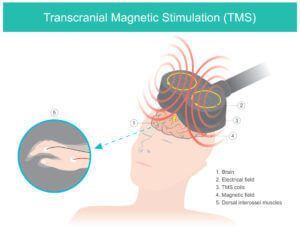
Clinical depression is a mood disorder that causes persistent sadness and loss of interest that can negatively interfere with one’s daily life. There are many ways to deal with significant depression ranging from medication and talk therapy to a handful of alternate treatments.
However, when these standard treatment options prove to be ineffective, the noninvasive procedure comes into play with positive results in more than 70٪ patients suffering from depression, anxiety, PTSD, OCD, and other brain health issues – transcranial magnetic stimulation (TMS).
TMS uses magnetic fields to stimulate the nerve cells in the brain that help improve the symptoms of depression. It also delivers repetitive magnetic pulses, so TMS is often referred to as repetitive TMS or rTMS.
Let’s take a closer look at this groundbreaking, FDA-approved therapy recommended for treating a major depressive disorder by the American Psychiatric Association and where you can go in Denver and Lakewood, CO, for effective depression management.
TMS Therapy for Depression – How Does it Work?
TMS treatment sessions work best if they occur every workday over a week. An electromagnetic coil is placed on your head during the painless rTMS treatment session. The treatment takes about 15-20 minutes, if a few are missed the clinical outcomes appear to be the same, making it flexible enough for work and life.
The electromagnet then delivers a magnetic pulse that stimulates the nerve cells in your brain involved with mood control and depression. The stimulation acts by easing your depression symptoms and improving your mood, which along with your progress and tolerance, is evaluated at each treatment session. You meet continuously throughout treatment with your provider and team to review your progress and, if necessary, make any adjustments to your treatment protocol.
There is no downtime following an rTMS treatment. So, you can resume your normal activities afterward. Since it is a noninvasive form of brain stimulation, rTMS does not require any pre or post-intervention. If you are prone to headaches, you may want to take Tylenol beforehand.
Common side effects of rTMS therapy – such as headache, scalp discomfort at the site of stimulation, lightheadedness, or the tingling, spasms, or twitching of facial muscles – are mild to moderate and improve shortly after a session and diminish over time with additional sessions.
Prior to your rTMS treatment, you will undergo a physical examination and psychiatric evaluation to discuss your depression and ensure that rTMS is the right option for you. During this evaluation, be sure to tell your doctor or mental health provider if you are pregnant (or thinking of becoming pregnant), have any metal or implanted devices in your body, are taking any medications, have a history of seizures or family history of epilepsy, have frequent or severe headaches, have brain damage from an illness or injury, have any other medical or mental health conditions, or have had prior treatment with rTMS.
If rTMS works for you, the symptom relief may take a few weeks. Nevertheless, you should continue treatment if or when you are symptom-free to prevent the return of symptoms. Discuss ongoing or maintenance treatment for your depression with your health care provider.
TMS Therapy in Denver and Lakewood, CO
At Denver Wellness Associates, our goal is to have every patient achieve better mental health and experience high satisfaction with the care we deliver. Our highly trained and talented team of therapists treat children, teens, and adults, providing a safe and supportive environment where they can obtain optimal mental health services they need to heal.
To learn more about TMS therapy and our other comprehensive services, contact Denver Wellness Associates today, in Denver and Lakewood, Colorado. You can reach us by phone at (720) 724-3668, email us at info@denverwellness.com, or simply request an appointment now using our interactive online form.
